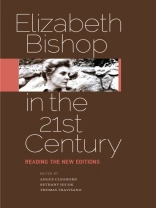In recent years, a series of major collections of posthumous writings by Elizabeth Bishop–one of the most widely read and discussed poets of the twentieth century–have been published, profoundly affecting how we look at her life and work. The hundreds of letters, poems, and other writings in these volumes have expanded Bishop‘s published work by well over a thousand pages and placed before the public a ‘new’ Bishop whose complexity was previously familiar to only a small circle of scholars and devoted readers. This collection of essays by many of the leading figures in Bishop studies provides a deep and multifaceted account of the impact of these new editions and how they both enlarge and complicate our understanding of Bishop as a cultural icon.
Contributors: Charles Berger, Southern Illinois University, Edwardsville * Jacqueline Vaught Brogan, University of Notre Dame * Angus Cleghorn, Seneca College * Jonathan Ellis, University of Sheffield * Richard Flynn, Georgia Southern University * Lorrie Goldensohn * Jeffrey Gray, Seton Hall University * Bethany Hicok, Westminster College * George Lensing, University of North Carolina * Carmen L. Oliveira * Barbara Page, Vassar College * Christina Pugh, University of Illinois at Chicago * Francesco Rognoni, Catholic University in Milan * Peggy Samuels, Drew University * Lloyd Schwartz, University of Massachusetts, Boston * Thomas Travisano, Hartwick College * Heather Treseler, Worcester State University * Gillian White, University of Michigan
A propos de l’auteur
Angus Cleghorn, Professor of English at Seneca College, is the author of Wallace Stevens’ Poetics: The Neglected Rhetoric. Bethany Hicok, Associate Professor of English at Westminster College, is the author of Degrees of Freedom: American Women Poets and the Women’s College, 1905–1955. Thomas Travisano, Professor of English at Hartwick College, is most recently the principal editor of Words in Air: The Complete Correspondence between Elizabeth Bishop and Robert Lowell.












